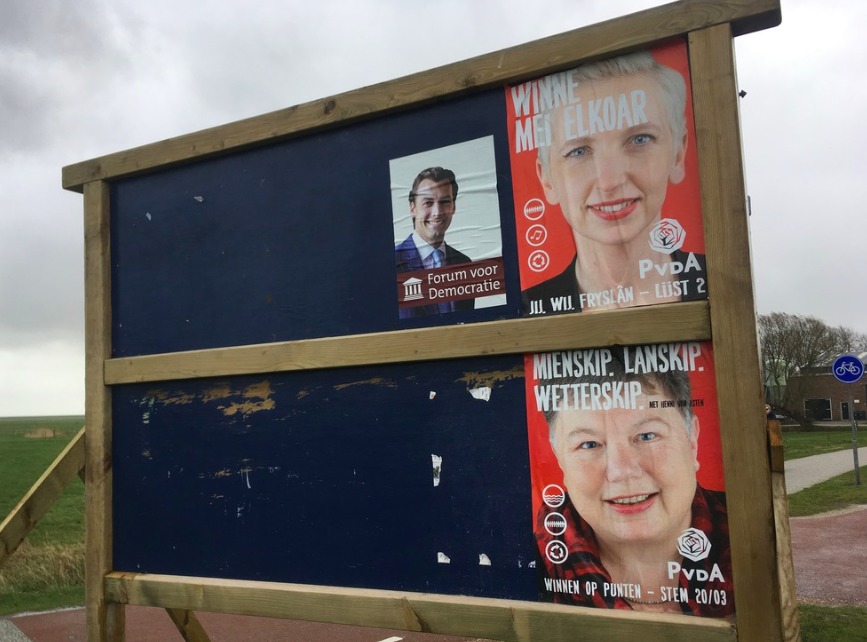Not an explosion, but a very loud noise: has Baudet really changed the landscape?


The headlines, inevitably, were dominated by Thierry Baudet after his remarkable success in the Dutch provincial elections on Wednesday, writes Gordon Darroch, in an analysis of what the victory really means.
Three years after being founded, and two years after upsetting the odds by grabbing two seats in parliament, Baudet’s Forum for Democracy (FvD) took around 14% of the national vote. In the fragmented Dutch political landscape, the support of one in seven electors was enough to put him on top of the pile, edging out the Liberal party (VVD) headed by Mark Rutte.
The FvD’s gains mean the party is set to take 12 seats in the 75-member senate when the upper house is elected by provincial deputies in May.
However, expectations of a political earthquake should be tempered for a few reasons. Firstly, despite its name, the Dutch senate is very much the minor player in the legislative set-up. As a revising chamber with an indirect mandate, it assesses laws mainly on technical merit rather than political or ideological grounds.
Opposition
Secondly, while the four-party coalition is set to lose its narrow majority, going from 38 senators to 31, the consequences are not as bad as they seem. Opinion polls before the vote suggested that Rutte’s cabinet would need to secure the support of two opposition parties in the senate.
In the event either the nine seats that will be filled by GroenLinks – Wednesday’s other big winner – or the seven held by the Labour party (PvdA) would be enough to get them over the line.
Rutte made overtures to the former last week when he dropped his opposition to a carbon tax for business, a move that was enthusiastically welcomed by GroenLinks leader Jesse Klaver, and the cabinet has softened its stance on migration, the issue that prompted Klaver to walk out of coalition talks two years ago.
Neither will Rutte have his work cut out rekindling his relationship with Labour leader Lodewijk Asscher, the deputy prime minister in the last cabinet, if their convivial sparring in the pre-election TV debate on Tuesday is anything to go by.
Vote-by-vote
Given these two options, the coalition is more likely to solicit support on a vote-by-vote basis than strike a confidence and supply deal with a single partner, a strategy that backfired on Rutte in 2012 when his first cabinet was brought down by Geert Wilders.
Finally, Baudet’s success reflects not so much a surge of the nationalist right as a shuffling of the pack among the populist parties. Nearly a third of his vote came from supporters of Wilders’s PVV, which is looking increasingly like a spent force.
Wilders has been the standard bearer on the right for the past 15 years but now appears to have been eclipsed by a younger, more sophisticated pretender.
A sizeable block also seems to have broken away from the left-wing populist Socialist Party, which has taken a more nationalist line on Europe and immigration since Lilianne Marijnissen replaced Emile Roemer as leader, only to find, like the PvdA before them, that offering a Diet Coke version of the populist right only encourages voters to seek out the real thing.
Modest success
Smaller numbers have defected from the coalition parties, but Baudet has had only modest success in attracting his real target audience – the influential and moneyed supporters of the VVD, most of whom have, somewhat uneasily, kept faith in Rutte.
Despite fears that Tuesday’s tram shooting in Utrecht might spark a surge in populist sentiment, it appears to have had little substantial influence. The last Peilingwijzer opinion poll, from canvassing carried out before the shooting, gave Baudet and Wilders a block of 18 seats, one more than the actual outcome.
As well as migration, Baudet scored in the campaign on the issue of climate change and energy transition, but so too did Green-Left, particularly in metropolitan areas such as Amsterdam, Utrecht and Groningen, where it took around a quarter of the vote.
GroenLinks
The polarisation on the issue reflects a gulf between voters who see tackling global warming as the number one political priority and those who resent the high personal cost. The cabinet will now have to revise its plans to meet the agreements in the Paris climate accord, but Wednesday’s results will give Jesse Klaver a much bigger say in the matter than Baudet.
There is also the question of whether FvD can build on its success. Baudet will now have to find 12 senators while learning to handle more than 100 inexperienced deputies in the provincial assemblies of varying calibre.
His manifesto is more comprehensive than Wilders’s pot-pourri of stock phrases, but his fondness for conspiracy theories and supremacist rhetoric is an unfortunate weakness for a self-styled intellectual.
He celebrated his victory with a labyrinthine speech peppered with vague classical references that, as it went on, sounded more like the product of a storytelling workshop at a survivalist summer camp than a mature political platform.
We have known for a while that Baudet is a politician in thrall to his own rhetorical skills, but he will need more than dog whistles to change the political mainstream.
Thank you for donating to DutchNews.nl.
We could not provide the Dutch News service, and keep it free of charge, without the generous support of our readers. Your donations allow us to report on issues you tell us matter, and provide you with a summary of the most important Dutch news each day.
Make a donation